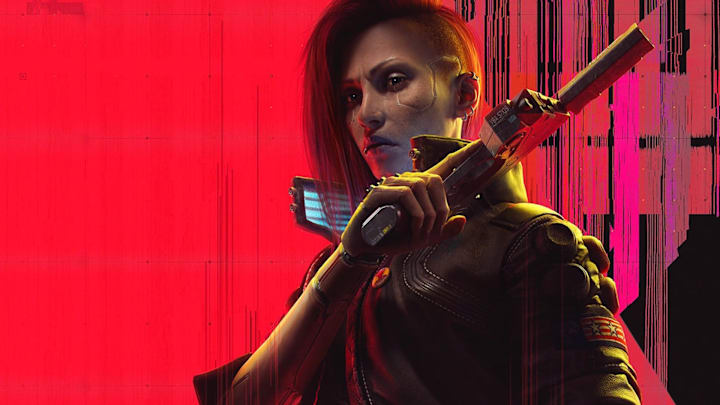Cyberpunk 2077 is a literary masterpiece

“You ever wake up in the middle of the night and not know who you are for a second? Or ever feel like you’re not really you? That’s how I feel all the time. Every moment. This emptiness. This helplessness.” – Lizzy Wizzy.
Spoilers follow…
What comes to mind when you think about the word “punk”? Anti-capital? Anarchy? Both are viable, but “identity” is arguably more important. Early British punks nihilistially daubed “No future” on walls, taken from the Sex Pistols song ‘God Save the Queen’, and their fashion reflected this slogan with jury-rigged outfits held together by safety pins, spit, and tape – the body as a symbol of opposition to polite society, but also of shared belonging.
In Cyberpunk 2077’s first main mission, you raid a scavenger den filled with killers who’ve been stealing people’s body parts to sell on the black market. To them, the body isn’t a symbol – it’s just meat, and meat is worth money. On the ride up, “No future” is scrawled on the elevator door, a cry for help from a populace whose bodies don’t belong to them anymore.
Music helps to form our identity in our teens. Goths, rockers, mods, new romantics, punks. Today you can see the impact of the grime scene all over UK street fashion. Step into the bustling back alleys of Tokyo and you’ll see the pop idol influence on kawaii fashion. In CD Projekt’s 2077, people still cling to music as a guiding light, a deeply personal artform that their identity hinges on.
In a world where brands dominate, erasing your identity until you’re just another affiliated corpo drone, the only way to rebel is to brand yourself in kind. In the same way music imprints on the culture, so do the corporations, which beam advertisements at you from any previously blank space and fill your brain with jingles and slogans.
Enter Johnny Silverhand, the aging rockerboy whose personality construct becomes trapped inside your head. Eventually, you’re told, his construct will overwrite you entirely and Silverhand will be in the driver’s seat. By the end of the game, you’ll find yourself wearing his clothes, using his gun, and driving his Porsche. This transformation is a two-way street.
Just as music, art, and culture leave their imprint on us, so do other people. People can change. They do it all the time. Are you your unfiltered self in every single social situation, or do you push levers up or down depending on your surroundings? Those short-term societal changes are one thing, but then there’s influence over time, like how two lovers create a shared language, a shorthand, that only they understand.
Johnny Silverhand replacing your conscious is akin to the Ship of Theseus (a philosophical thought experiment where a ship’s planks are replaced one by one until there’s nothing of the original left) – Johnny is replacing the wooden planks of your mind while you leak into his persona. If every plank is replaced, are you still the same person? Are you a combination of two people?
This theme is reinforced in the world’s transhuman body modding, which makes people lose their minds to “cyberpsychosis” if they replace too many meat planks in their human ship. The opening quote in this piece from Lizzy Wizzy, a musician who replaced her skin with chrome, comes just hours before she murders her partner. Perhaps she replaced too many planks. Then again, maybe this is just the cost of fame.
You can give Silverhand your body as you meld with Alt Cunningham, Silverhand’s old girlfriend, and another Ship of Theseus who’s become a rogue AI. She tells you she’s no longer Alt, but a person is still the same person when they change. That’s just character development. Humans can’t just be our unbroken chain of memories through time, because memories themselves are often suppressed and forgotten.
You take control of Silverhand, now in your body alone, as he wraps things up before leaving Night City. He’s a completely different person. He’s given up smoking, he’s sentimental and thoughtful, no longer acting on impulse, and he seems at peace. He carries your character with him, and not just because he’s wearing their skin.
Making love with your nervous system connected to another person, a bare-knuckle boxing fight with a guy who has two bodies, Judy connecting her memories to yours as you dive into a lake and lose all other sensations – Cyberpunk 2077 explores identity from dozens of angles in main missions, side quests, and even the smaller world activities, appropriately named “gigs”.
The people in this cold, mechanical world are desperate for some kind of connection, to the point where “braindances” – reliving someone’s memory and feeling what they felt during an exciting, horrific, or pleasurable moment – have become the go-to entertainment for the denizens of Night City. During the Sinnerman quest, you meet a corporate stooge who has a throwaway line about how she can’t wait for the day when they no longer have to use people as actors, reflecting the anti-art AI fanatics of today.
Elsewhere, Judy tells you during the diving mission that she’s searching for the perfect emotional response, hence connecting your mind to hers for a raw, human reaction to those memories as you explore her flooded hometown. She believes she can make art more meaningful through a real human connection and primal, raw emotion. Two minds imprinting on one another.
Whether Cyberpunk 2077’s thematic coherence was planned out or accidental is beside the point. Hundreds of people worked on Cyberpunk 2077 and created this cohesive, literary masterpiece that left its mark on thousands more. Osmosis or otherwise, this brilliant work of art emerged at the end of it. These stories live in all our minds now, connecting us without ever having to meet.
